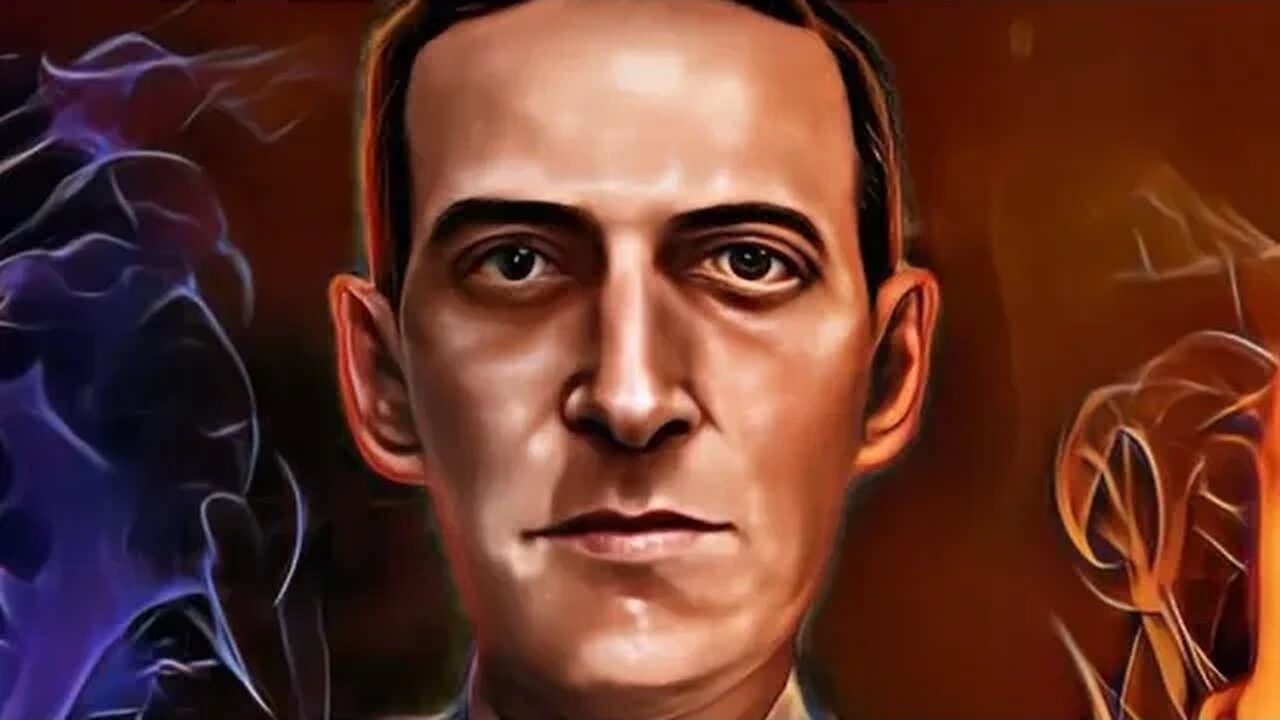Premium Only Content

H.P. Lovecraft: Physiology Of Fear
Horror fiction author H.P. Lovecraft wrote short stories, novels and novellas, including 'The Call of Cthulhu' and 'The Case of Charles Dexter Ward.'
Who Was H.P. Lovecraft?
H.P. Lovecraft was born in 1890, in Providence, Rhode Island. The horror magazine Weird Tales bought some of his stories in 1923. His story "The Call of Cthulhu" came out in 1928 in Weird Tales. Elements of this story would reappear in other related tales. In his final years, he took editing and ghostwriting work to try to make ends meet. He died on March 15, 1937, in Providence, Rhode Island.
Early Life
Lovecraft was born Howard Phillips Lovecraft in 1890, in Providence, Rhode Island. Lovecraft had an unusual childhood marked by tragedy. His traveling salesman father developed a type of mental disorder caused by untreated syphilis when he was around the age of three. In 1893, his father became a patient at the Butler Hospital in Providence and there he remained until his death in 1898.
A sickly child, Lovecraft spent many of his school years at home. He became an avid reader, devouring works on a variety of texts. Lovecraft loved the works of Edgar Allan Poe and developed a special interest in astronomy. As a teenager, he did attend Hope High School, but he suffered a nervous breakdown before he could earn his diploma. Lovecraft became a reclusive figure for several years, choosing to stay up late studying and reading and writing and then sleeping late into the day. During this time, he managed to publish some articles on astronomy in several newspapers.
Writing Career
Lovecraft started out as a would-be journalist, joining the United Amateur Press Association in 1914. The following year, he launched his self-published magazine The Conservative for which he wrote several essays and other pieces. While he had reportedly dabbled in fiction early on, Lovecraft became more serious about writing stories around 1917. Many of these early works were influenced by the writings of Lord Dunsany, an Irish author of fantasy tales, as well as Lovecraft's early favorite Edgar Allan Poe.
The horror magazine Weird Tales bought some of Lovecraft's stories in 1923, giving him his first taste of literary success. The following year, he married Sonia Greene. The couple lived together in New York City for two years before splitting up. After his marriage failed, Lovecraft returned to Rhode Island and began work on some of his best stories. "The Call of Cthulhu" came out in 1928 in Weird Tales, and it perhaps best illustrated Lovecraft's efforts at creating an otherworldly type of terror.
Lovecraft introduced readers to the first of many supernatural beings that would wreak havoc on humankind. Elements of this story would reappear in other related tales—collectively known by many as the "Cthulhu Mythos." These later stories reflected Lovecraft's own philosophical ideals. According to American Heritage magazine, Lovecraft once wrote, "all of my tales are based on the fundamental premise that common human laws and emotions have no validity or significance in the cosmos-at-large."
Death and Legacy
In his final years, Lovecraft was barely able to support himself. He took editing and ghostwriting work to try to make ends meet. Lovecraft died of cancer on March 15, 1937, in Providence, Rhode Island. He left behind more than 60 short stories and a few novel and novellas, including The Case of Charles Dexter Ward. Lovecraft's passing was mourned by his devoted following of colleagues and aspiring writers with whom he corresponded and collaborated. Two of these friends, August Derleth and Donald Wandrei, formed a publishing company called Arkham House to promote and preserve Lovecraft's work.
Since his death, Lovecraft has earned greater acclaim than he enjoyed during his lifetime. He has been an inspiration to such writers as Peter Straub, Stephen King and Neil Gaiman. His stories have also served as the inspiration for numerous films, including 2011's Hunters of the Dark and 2007's Cthulhu. As King explained to American Heritage magazine, "Now that time has given us some perspective on his work, I think it is beyond doubt that H.P. Lovecraft has yet to be surpassed as the twentieth century's greatest practitioner of the classic horror tale."
-
 1:00
1:00
Literati
1 year agoAwakening
86 -
 LIVE
LIVE
Glenn Greenwald
3 hours agoTrump's Tariffs: A Threat to the Neoliberal Order? With Journalist David Sirota; Biden CBP Fabricated Doc to Help Imprison Bolsonaro Adviser? Plus: Israel Support Collapsing | SYSTEM UPDATE #436
18,895 watching -
 LIVE
LIVE
The Jimmy Dore Show
2 hours agoTrump EXCITED About Trillion-Dollar Defense Budget! Zelensky Claims to Capture Chinese Soldiers!
10,415 watching -
 LIVE
LIVE
Melonie Mac
4 hours agoGo Boom Live Ep 44!
559 watching -
 49:41
49:41
BonginoReport
3 hours agoKristi Noem Honors Angel Mom After Son's Brutal Murder - Nightly Scroll w/Hayley Caronia (Ep.23)
72.6K27 -
 LIVE
LIVE
Stephen Gardner
1 hour ago🔥WTF! Dan Bongino’s CRYPTIC ARREST message!
1,159 watching -
 LIVE
LIVE
2 MIKES LIVE
3 hours ago2 MIKES LIVE #203 Lone Survivor with Donna Axelson and Adam Flynn!
194 watching -
 1:18:49
1:18:49
Kim Iversen
4 hours agoEXPOSED: Inside Tim Pool’s Secret Meeting with Netanyahu | Trump’s Tariff Gamble: Boost for America or Death Blow?
83.4K120 -
 LIVE
LIVE
Biscotti-B23
5 hours ago🔴 LIVE GETSUGA GAUNTLET 🔥 TRAINING FOR RANKED ⚔ BLEACH REBIRTH OF SOULS
34 watching -

Sarah Westall
1 hour agoMassive Spiral Structures Found Under Giza Pyramids, Advanced Ancient Societies w/ Jay Anderson
3.66K4